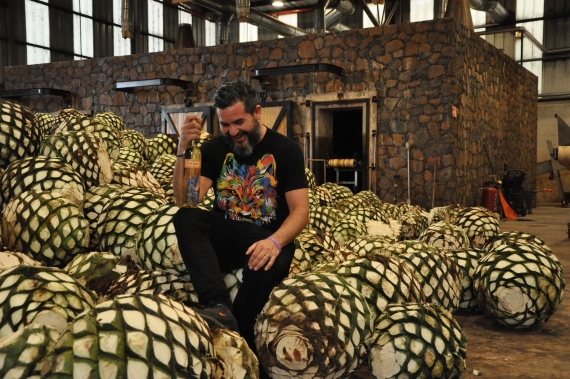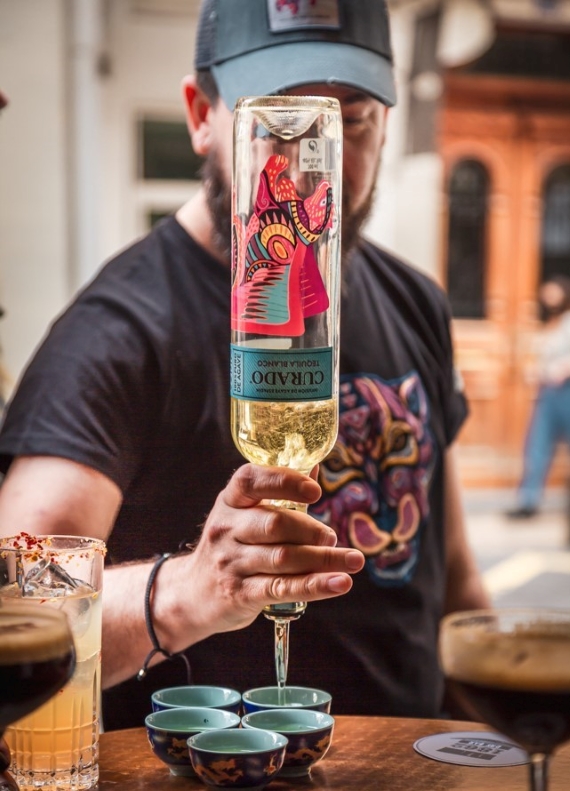In June, Dwayne ‘The Rock’ Johnson announced to his 384 million Instagram followers that his Teremana tequila brand had surpassed 1 million cases, despite only launching in 2020. Diageo’s Casamigos, founded by George Clooney, is also a member of The Millionaires’ Club and with Kevin Hart, Justin Timberlake, Kendall Jenner, Michael Jordan, LeBron James and Mark Wahlberg (to name a few) all involved in tequila there’s clearly money to be made.
For context it would be naïve to think they’re all life-long tequila lovers – more business operators who can sniff a profit. Yet their involvement has definitely driven tequila sales.
“Celebrity participation adds sophistication to the category, and elevates the drink to a luxury status and lifestyle offering,” says Mariana Fletcher, head of US insights, IWSR Drinks market Analysis.
“Celebrities organically expand the base of demand for tequila by attracting a global and diverse group of followers and fans.”
A statement from IWSR also said: “According to IWSR figures, celerity tequilas grew at a volume CAGR of 50% between 2016 and 2021, bringing US$1.9bn in global revenues during 2021 alone. The celebrity factor is not only influential in the US – it also helps to elevate tequila’s image in smaller but potentially lucrative markets for the future, such as the UK.”
This all sounds fairly positive – popular celebrities endorsing or creating premium brands which put tequila in the spotlight. However, there are some reservations from members of the industry. Jorge Balbontin, Curado tequila brand manager, is disappointed by the impact of the world’s A-listers.
“The idea of celebrity brand ambassadors started out in the world of expensive watches and fashion,” says Balbontin. “With brands getting their products worn by recognisable faces to improve their image and prestige. This has now entered the tequila industry and it’s become the biggest driving force for sales, and people are even paying a premium to drink tequilas which are the face of George Clooney, Kevin Hart or Justin Timberlake.
“If this was used in a positive way to expose what tequila really is and should be, that would have been fantastic. For the past 30 years the tequila industry has been working hard to get away from the old imagery associated with the category and increase the exposure of Mexican culture, and a lot of this is now being undone.”

Above, Jorge Balbontin
Sierra tequila, which is sold in more than 90 countries globally, is owned by Borco-Marken-Import and Philipp Stahl, senior brand manager, also has reservations about celebrity involvement in tequila.
“Celebrity endorsement has definitely brought significant attention and exposure to tequila brands,” he says, “which led to heightened consumer awareness and interest in the category. This is very specific for the US market but also in other parts of the world extensive fan bases and loyal followings on social media channels have potentially created new tequila consumers.
“However, with many new celebrities entering the tequila market, trying to recreate some of the success stories of others, there is a risk of oversaturation.
“Also, the increased competition can make it challenging for small, independent brands to gain visibility and establish themselves in an already crowded market. It is crucial for tequila brands to carefully consider the long-term implications and ensure they maintain the quality and integrity of the product, regardless of celebrity involvement.”
CRISTAL CLEAR
One of the big tequila trends which has taken centre stage in recent years is the development of cristalino tequilas. These are aged tequilas which undergo charcoal filtering to rid the spirit of any colour – the theory being that it produces a tequila with more approachable wood flavours and a smoother mouthfeel but with the appearance of a blanco.
According to the same IWSR report: “100% agave and cristalino tequilas are driving global category expansion, with cristalino achieving the highest volume growth of all tequila product segments between 2016 and 2021, albeit from a lower volume base.”
Kristopher DeSoto, founder and chief executive of Hiatus tequila, said in a report by The Manual: “I personally find the majority of cristalinos too sweet, generally lacking body, or through the use of additives it has an unnatural body. But most importantly, due to the ageing and then extra filtering, they lack the robust agave notes that make tequila so unique to other distilled spirits.
“Additives are a touchy subject in the industry and something we try to educate people on,” adds DeSoto. “Some of the biggest brands out there are full of them because they make a crap product that they then need to doctor up to be consumable.” He believes that since some large brands are already using additives in their aged tequila, it follows suit that their cristalino will have them. “Even if they don’t add anything to their cristalino, there was probably something added already, and ironically they then tried to filter some of that back out.”
EXTRA 1%
The use of additives, as DeSoto mentions, is contentious in tequila. It’s commonly understood that mixtos contain at least 51% agave, meaning that 100% agave tequilas are more sought after and demand higher price points. But actually, even in tequilas supposedly just containing agave, up to 1% is allowed to be made up of additives such as colouring, extracts and glycerine as well as a host of others which brands can legally not disclose on the bottle under the regulations of the Consejo Regulador del Tequila (CRT).

Balbontin adds: “For me the celebrity movement coincides with the sudden growth of crystalino tequilas. These two trends suggest to me that companies are trying to make quick and easy money. It’s surprising to me that some of the latest celebrity-backed tequilas are still very much full of additives and vanilla-forward. It’s diminishing the category.”
Eva Longoria, an American actor born in Texas to Mexican parents, launched her own brand called Casa Del Sol in 2021, which Balbontin was also left disappointed by. “I had really high hopes for Eva Longoria’s brand because she’s been an advocate for Mexican life and her heritage, yet her tequila is very much the opposite. All of the tequila geeks in the industry were dying to try her tequila in the hope that it would be decent, not amazing, but at least decent and agave-forward, but it wasn’t.”
Balbontin believes these easy-drinking tequilas being launched by celebrities are now causing massive confusion within the industry because consumers will try a vanilla-heavy spirit and think they like traditional-style tequila. The reverse argument is that regardless of the style, people are drinking tequila and growing the category, but in the long run this will only confuse consumers who think they know and understand premium tequila, and could isolate the more traditional, agave-forward producers.
“I think it’s wrong what these brands are doing because they aren’t representing what tequila should be – a characterful, agave-forward spirit which is unique from other categories – and I don’t think this is going to end anytime soon. But what really surprises me is that there hasn’t been one celebrity to launch a tequila which we can call even decent.
“I’ve been adamantly trying them all in the US when I’ve been travelling and not a single one of them is free of additives.
“Money really talks, because the master distillers behind these brands are all of a certain level and reputation and they’re putting it on the line. This is a shame because they all know how to make an outstanding tequila, but they equally all know the shortcuts to make one quickly and easy to drink, which celebrities and companies want to endorse.”
The silver lining through all of this is that, regardless of the style or quality of the tequila, people are entering the category and serious investment is being generated into the region through these celebrity endorsements.
“Right now I’d say there’s fewer than 10 distilleries or families making good, tasty examples of what a tequila should be, which is a tiny proportion of today’s market. But the good thing is that these few brands are also growing in line with the wider growth of the market.
“I’m still waiting for a celebrity to endorse an authentic style of tequila because I really think it will be a game changer. Will it make as much money as something like Casamigos? Probably not, but it will showcase what traditional tequila represents and what it should taste like.”
If we went back in time 20 years, tequila producers would likely still welcome the investment and attention of the world’s A-list celebrities. The movement still carries huge potential for the category not only to grow its sales, but invest in the Jalisco region and create a bright future. But there’s a real risk that this movement is blindly leading consumers into the category with additive-filled tequilas which could distort the opinion of what ‘real’ tequila tastes like and represents. However, while this is a potential long-term issue, it’s crucial for the immediate future of the category that this new investment goes into the sustainable growth and harvesting of agave, which has thus far been neglected.




